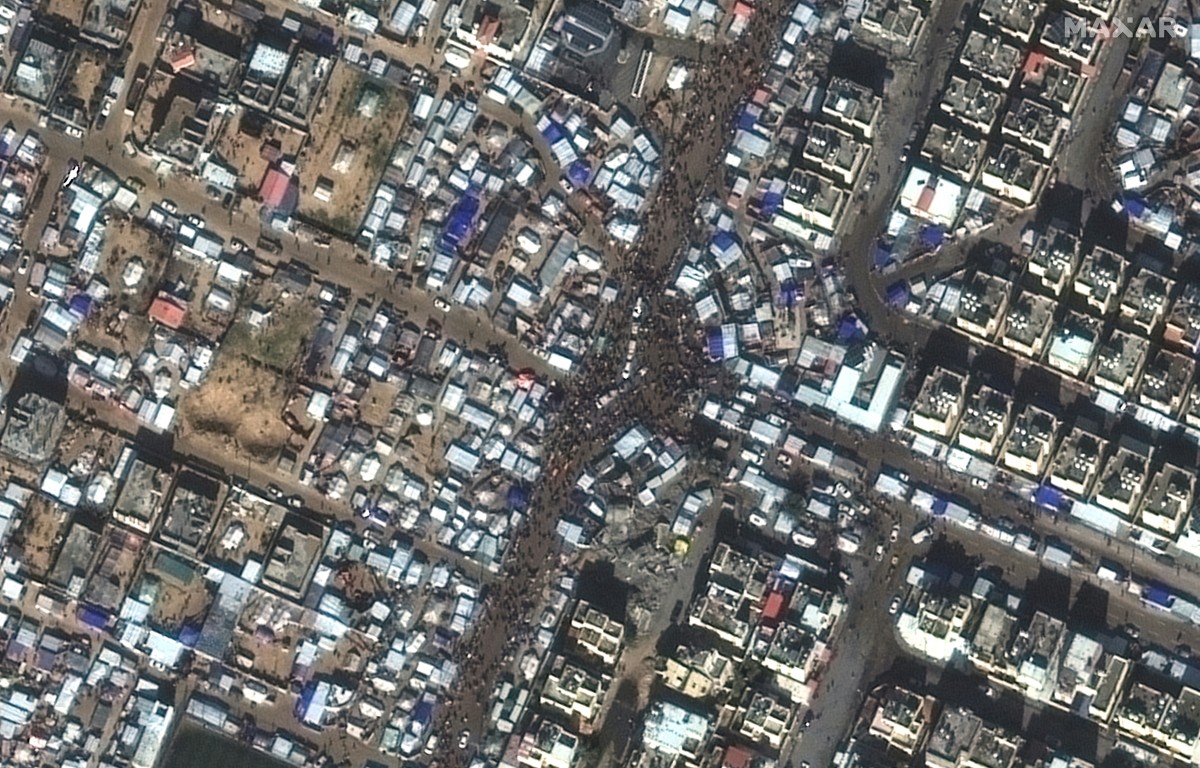Palestinian Territories – Israel faced renewed calls from key ally the United States on Friday against launching a large-scale attack on Gaza’s southern city of Rafah, where nearly 1.5 million Palestinians are trapped.
Israeli Prime Minister Benjamin Netanyahu has insisted he would push ahead with a “powerful” operation in the overcrowded city to achieve “complete victory” over the Hamas.
The White House said US President Joe Biden had spoken by phone with Netanyahu late Thursday, urging him not to carry out an attack on Rafah without a plan to keep civilians safe.
Hundreds of thousands of people have been driven into Rafah, seeking shelter in a sprawling makeshift encampment near the Egyptian border.
The city now hosts more than half of Gaza’s population, with displaced people “crammed” into less than 20 percent of the territory, according to UN humanitarian agency OCHA.
“We were displaced from Gaza City to the south,” said Ahlam Abu Assi. “(Then) they told us to go to Rafah, so we went to Rafah.
“We can’t keep going and coming,” she added. “There is no safe place for us.”
Britain, Australia, Canada and New Zealand have also urged Israel not to launch a ground offensive in the city.
Prime Minister Rishi Sunak told Netanyahu by phone that Britain was “deeply concerned about… the potentially devastating humanitarian impact of a military incursion into Rafah,” his office said.
Israeli strikes killed 112 people early Friday across the Palestinian territory, the Hamas-run health ministry said.
Israel’s army reported the death of another soldier in Gaza early Friday, raising the number of soldiers killed in the ground operation to 233.
Hospital raid
Roughly 130 hostages are still believed to be in Gaza after the October 7 attack on Israel by Hamas fighters, which resulted in the deaths of about 1,160 people, mostly civilians, according to an AFP tally based on official Israeli figures.
Dozens of the estimated 250 hostages seized during the attack were freed in exchange for Palestinian captives during a week-long truce in November. Israel says 30 of those still in Gaza are presumed dead.
At least 28,663 people, mostly women and children, have been killed in Israel’s assault on the Palestinian territory, according to the health ministry.
Israel sent troops into one of the largest medical sites in southern Gaza on Thursday, saying its forces were hunting for hostages and carrying out a “precise and limited operation” at the facility.
Intense fighting has been reported in recent days between Israeli forces and Hamas fighters around Nasser Hospital — one of the territory’s few operational medical facilities.
Israel, which has accused Hamas fighters of using hospitals for military purposes, said it was carrying out a “precise and limited operation” at the facility with “no obligation” for patients or staff to evacuate.
Israeli army spokesman Daniel Hagari said there was “credible intelligence from a number of sources, including released hostages, indicating that Hamas held hostages at the Nasser Hospital in Khan Yunis and that there may be bodies of our hostages” there.
The health ministry in Hamas-ruled Gaza reported that thousands of people who had sought refuge in the complex, including patients, have been made to leave in recent days.
It has called the situation at Nasser “catastrophic”, with staff unable to move bodies to the morgue because of the risks involved.
Medical charity Doctors Without Borders (MSF) described a “chaotic situation” in the hospital after it was shelled early Thursday, killing and wounding multiple people.
“Our medical staff have had to flee the hospital, leaving patients behind,” MSF said, with one employee unaccounted for and another detained by Israeli forces.
The World Health Organization has described Nasser Hospital as a critical facility “for all of Gaza”, where only a minority of hospitals are even partly operational.
The UN Human Rights Office said Israel’s raid on the hospital appeared to be “part of a pattern of attacks by Israeli forces striking essential life-saving civilian infrastructure in Gaza, especially hospitals”.
Truce talks
Mediators from the United States, Qatar and Egypt gathered in Cairo to broker a deal to halt the fighting and see the release of the remaining hostages in exchange for Palestinian captives held by Israel.
CIA director Bill Burns made an unannounced visit to Israel on Thursday for talks with Netanyahu and the head of Israel’s Mossad intelligence agency, David Barnea.
Barnea had already held talks with Burns and Egyptian and Qatari representatives in Cairo on Tuesday, before a Hamas delegation visited Wednesday.
US Secretary of State Antony Blinken said he believed an agreement was still possible.
“We’re very focused on it and I believe it’s possible,” he said on a visit to Albania.
Netanyahu’s office said it had not received “any new proposal” from Hamas about releasing hostages, and Israeli media reported the country’s delegation would not return to negotiations until Hamas had softened its stance.
While he did not comment directly on those reports, Netanyahu said: “I insist that Hamas drop their delusional demands and, when they drop these demands, we can move forward.”
Palestinian president Mahmud Abbas, who heads the West Bank-based Palestinian Authority, has urged Hamas to “rapidly” agree to a truce and stave off further tragedy.
Netanyahu said late Thursday he rejected a plan for international recognition of a Palestinian state, following reports of the plan in The Washington Post.








